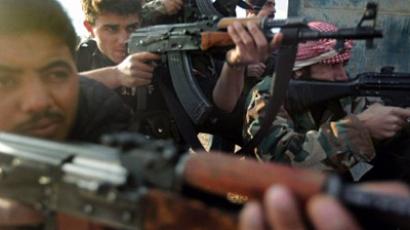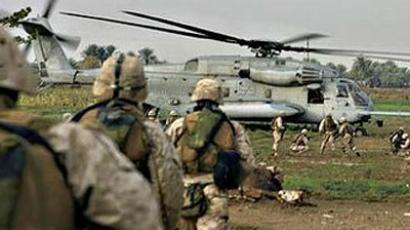Russia puts new draft resolution on Syria to UNSC
Russia, surprisingly to Western powers, has put forward a UNSC resolution on Syria, calling on the Syrian parties to end violence and start talks. Meanwhile, Syria's vice-president is visiting Moscow to discuss peaceful solutions for the crisis.
The Kremlin's UN envoy Vitaly Churkin, who holds the council presidency for the month in December, did not disclose the exact contents of the text, saying it will be discussed by the 15 council members in the coming days.He expressed his hope the balanced draft would be passed, calling the UN Security Council’s reaction to it “constructive”. "We made no secret of the fact and it is reflected in the text that we call on violence to be stopped from all sides. We are concerned about weapons smuggling, the armed groups operating in Syria. As you know from the outset our assessment of the situation is that various violent groups there are taking advantage of peaceful demonstrators in order to pursue their agenda. So those concerns are reflected in the draft resolution,” Churkin said. The draft resolution proposed by Russia endorses efforts by the Arab League to resolve the crisis in Syria and welcomes plans to deploy a monitoring mission in the country as clashes between the Syrian army and the opposition continue.In response to Russia’s move, US Secretary of State Hillary Clinton indicated that Western nations would try to work with Russia in a bid to pass a first Security Council resolution on the crackdown, which the United Nations says has left more than 5,000 dead.“Hopefully, we can work with the Russians who, for the first time, at least are recognizing that this is a matter that needs to go to the Security Council,” Clinton said at the State Department in Washington. “It is just that we have differences in how they are approaching it, but we hope to be able to work with them.”However, Clinton said that though she had not seen the draft and had it just briefly described to her, there are some issues in it that the US “would not be able to support."As a key ally of Syria, Russia has been actively trying to mediate a peaceful solution for months. With China, it vetoed a council resolution proposed by European nations in October condemning President Assad's actions.Syria's Vice-President Farouk al-Sharaa has arrived in Moscow where he will hold talks with officials in Moscow on Friday.The Free Syrian Army claims to have more than 25,000 members fighting to bring down President Assad.Western nations still refuse to acknowledge that anti-regime protesters are armed.US-based military whistleblower Sibel Edmonds says Washington is siding with the opposition to force regime change.“They have had this division that ran the rebels there. They also help the rebels to smuggle arms into Syria, but also they have a communication division there in order to actually increase the number of defectors of the current Syrian army,” she said.
Jeremy Salt, a professor of Middle East politics at Bilkent University, believes that the Western states are clearly working towards a military intervention in Syria. Although, he says, the cost of intervention at the heart of the Middle East will be very high, especially while Russia is engaged in searching for political solutions to the crisis “This resolution today is being taken as a sign by some that Russia is changing its position,” said Salt. “I certainly do not see it like that. I think Russia is generally trying to find the way out of this which would involve first of all people putting down their weapons.”“And it’s not just the Syrian government that has to issue orders for the army to put weapons down, but somehow some way has to be found of persuading others to put down their weapons as well,” he added.














